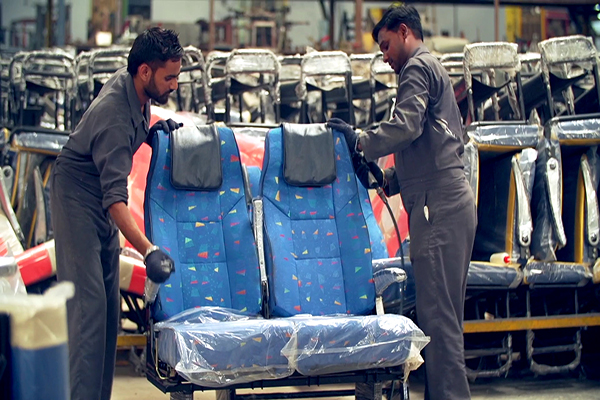Smart manufacturing has already started making its mark within the industry. Manufacturers have begun transforming their infrastructure, processes, and other capabilities with smart technologies. With the emergence of new technologies such as artificial intelligence, automation, streamlined supply chains, and precision quality control, this transformation is set to redefine the industrial landscape.
Not only do huge possibilities arise, but technological transformations also come with the cost of many complexities and challenges. Therefore, manufacturing businesses must lay out a clear roadmap for navigating the complexities of the smart manufacturing era.
Strong Research & Development
Research and Development (R&D) play a pivotal and multifaceted role within the manufacturing industry, acting as a driving force behind innovation, operational efficiency, and the unwavering pursuit of exceptional quality. Any advancement in the industry, whether related to the product or the manufacturing process, always begins with strong R&D. The implementation of innovative ideas becomes feasible with R&D, resulting in fewer errors or none in the output.
At MSL, R&D is always at the core. Strong R&D enhances the capability of the entire manufacturing unit and enables the manufacturer to meet the demands. R&D constitutes an indispensable cog in the product development machinery, systematically engaging in the design and refinement of items to meet and exceed the exacting demands of quality standards.
R&D assists with prototyping and ideation. This facilitates the early detection and correction of potential issues, saving valuable time and resources by avoiding costly modifications in later stages of production. The synergy between R&D and innovation fosters a culture of continuous improvement, where every aspect of manufacturing is subject to scrutiny and enhancement.
Investing in Qualified Manpower
Investing in a skilled workforce is crucial for any business, as it leads to various benefits. The positive outcomes are manifold, ranging from heightened productivity and decreased defects to a substantial boost in sales, ultimately yielding a favorable return on investment. Well-trained and well-equipped staff make fewer errors, lowering the cost of quality. Effective sales teams generate revenue and establish lasting client relationships. Furthermore, reducing personnel turnover is essential, as it directly impacts ROI.
Infrastructure Development
The integration of new technologies requires top-notch infrastructure. Industries must examine their present infrastructure and make necessary upgrades to adapt to the requirements of smart manufacturing. This could entail modernizing manufacturing units, upgrading machinery, and improving information technology systems. Establishing a solid technological basis is critical for a smooth transition into the new manufacturing era. Having high-end infrastructure is important, but what is more crucial is the capability and readiness to upgrade the existing infrastructure to match the industry standards.
Overcome Existing Challenges
Manufacturing transportation components, such as buses, railway systems, and metro, involves challenges. These components, including windows, chassis, bogie frames, sidewalls, doors, coaches, and seats, must ensure safety, operation, and comfort. Manufacturers face numerous significant challenges. Continuous innovation is essential in this industry to meet evolving demands and outpace competitors. Identifying innovative solutions to enhance functionality, durability, and efficiency is a key challenge.
Cost-effectiveness
Achieving cost-effectiveness is crucial to make products affordable for end-users. Optimization of production processes, minimizing material waste, and leveraging economies of scale are necessary to reduce costs without compromising quality.
Quality
Maintaining consistent quality standards throughout large-scale production is challenging. Variations in raw materials, complex manufacturing techniques, and safety regulations compliance pose difficulties.
Rigorous testing at various production stages is essential to assure quality as well as guarantee functionality, reliability, and safety. Implementing a comprehensive testing schedule, including quality checks, stress tests, and performance evaluations, is a challenging task.
Supply Chain
Timely delivery of assemblies, components, and parts is vital for public transportation systems. Meeting delivery deadlines while ensuring quality adherence can be a significant challenge, with disruptions in the supply chain affecting production schedules and the transportation network.
Conclusion
Manufacturing components and parts for buses, trains, and other commercial vehicles entails specific challenges. Nevertheless, manufacturers within this sector can align with the expectations of the transportation industry by implementing comprehensive testing procedures, prioritizing quality standards, embracing innovation, ensuring cost-effectiveness, and upholding on-time delivery commitments.
To thrive in this competitive environment, manufacturers must foster a culture of innovation, consistently exploring novel ideas and solutions to enhance their products.
Robust research and development, a highly skilled workforce, upgraded infrastructure, and the resolution of existing challenges constitute the foundational elements of this preparation. Success in the smart manufacturing revolution will hinge on how effectively industries prepare and adapt to the evolving landscape. It’s not merely about keeping pace with change; it’s about leading the change into a brighter, more efficient industrial future.















